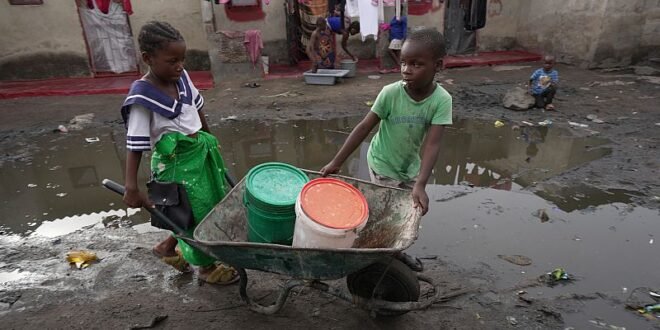Growing Cholera Crisis in West and Central Africa
An alarming situation is unfolding across West and Central Africa, where an estimated 80,000 children are at severe risk of cholera. The crisis is being worsened by heavy rains that have led to widespread flooding, displacement, and a breakdown in essential services. This has intensified ongoing outbreaks in the Democratic Republic of the Congo (DRC) and Nigeria, raising concerns about the potential spread of the disease across borders.
The combination of extreme weather conditions and unstable living situations has created an environment conducive to the rapid transmission of cholera. With limited access to safe water and proper sanitation, the situation is becoming increasingly dire for vulnerable populations, especially children.
Outbreaks Spread Amid Flooding and Displacement
Cholera outbreaks are not only affecting the DRC and Nigeria but also neighboring countries such as Chad, Ghana, Côte d’Ivoire, and Togo. These nations are now on high alert due to their susceptibility to the disease. Other countries, including Niger, Liberia, Benin, the Central African Republic, and Cameroon, are also monitoring the situation closely.
Gilles Fagninou, UNICEF Regional Director for West and Central Africa, highlighted the severity of the situation: “The combination of heavy rains, flooding, and mass displacement is creating a perfect storm for cholera transmission.” He emphasized that with already scarce resources for safe water and hygiene, the region is facing a critical challenge.
DRC Faces Worst Cholera Crisis in Years
The DRC is currently experiencing its worst cholera crisis in recent years. In July alone, over 38,000 cases were reported, with 951 deaths—25.6% of which involved children under five years old. High-risk provinces include South Kivu, North Kivu, and Tanganyika, where poor sanitation and lack of clean water make communities particularly vulnerable.
In Kinshasa, the capital city, the number of cholera cases has surged following weeks of torrential rain and floods. Hospitals are overwhelmed, and the city’s case fatality rate has reached 8%, indicating a significant strain on the healthcare system. Without immediate intervention, the country could face its worst cholera outbreak since 2017.
Chad and Nigeria Grapple with Rising Cases
In Chad, 55 suspected cholera cases—including four deaths—have been reported at the Dougui refugee site near the Sudanese border. Tests confirmed the presence of Vibrio cholerae, the bacteria responsible for the disease. Displaced children are particularly at risk due to overcrowded conditions and unsafe water sources.
Nigeria, the second-most affected country in the region, recorded 3,109 cases and 86 deaths across 34 states by June. Cholera remains endemic in the country, and recurring outbreaks continue to strain an already fragile health system.
Call for Immediate Action
UNICEF and regional health authorities are urging swift action to scale up access to clean water, improve sanitation, and provide medical supplies to curb the spread of cholera. Gilles Fagninou stressed the urgency of the situation: “Children are paying the highest price. We must act now to prevent further loss of life.”
As the rainy season continues, the window of opportunity to contain the crisis is shrinking. A coordinated regional response is essential to protect vulnerable communities and prevent further devastation. The international community must step up efforts to support affected nations in addressing this growing public health emergency.
 Info Malang Raya Its All About World News
Info Malang Raya Its All About World News




